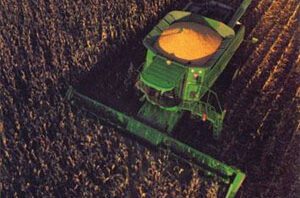Earlier this month, USDA made clear that they plan to give the final go-ahead to the next generation of herbicide-resistent GE seeds. Widespread public concern about this new technology delayed its approval by more than two years. But on September 6, the final 30-day "waiting period" will come to a close, and Dow's new 2,4-D corn and soy will be approved for market.
PAN stands with communities across the country who are outraged at the pending decision. "USDA is much more interested in working with Dow and Monsanto to bring their products to market than in protecting the well-being of our farmers and rural communities," says PAN Senior Scientist Dr. Marcia Ishii-Eiteman in a passionate press statement.
The products in question are Dow’s 2,4-D resistant corn and soy seeds, genetically engineered to be used with Dow’s Enlist Duo weedkiller (a combination of 2,4-D and glyphosate).
The agency is moving forward with approval despite their own acknowledgement that the new seeds will dramatically increase the use of 2,4-D, which raises significant economic and public health concerns for rural communities:
Drift damage: 2,4-D is highly prone to drift, into neighboring fields. Drift damage is of particular concern for those farmers growing speciality crops and organics.
Health risks: It's a known reproductive toxicant, suspected endocrine disruptor and possible carcinogen — and as with many pesticides, children are particularly susceptible to its effects.
USDA overlooked these risks by focusing solely on the impacts of the seeds themselves, rather than at the entire technology package of seeds and herbicides.
Choosing the pesticide treadmill
The USDA decision keeps farmers tethered to an increasingly dangerous — and expensive — pesticide treadmill.
As "superbugs" and "superweeds" develop, a farmer will spend more on pesticides each year just to keep crop loss from pests at a standard rate. Farmers get caught on the treadmill as they are forced to use more and more — and increasingly toxic — chemicals to control insects and weeds that develop resistance to pesticides.
Dow's 2,4-D corn and soy are the wrong answer to the superweed problem that's been created by the rapid, widespread adoption of Monsanto's RoundUp Ready crops. These new crops — and the other herbicide-resistant technologies in the queue — will in turn create resistance.
USDA's decision also shows just how broken our regulatory system is, that significant impacts — in spite of being well understood — are swept under the rug. As Dr. Ishii-Eiteman explains:
USDA's final Environmental Impact Statement on Dow's 2,4-D-resistant crops states its unchanged intention to deregulate these crops, demonstrating the Agency's stunning indifference to farmers' interests. More than half a million farmers, scientists, health professionals and individuals have voiced their concerns regarding the risks that accompany Dow's pesticide-seed technology, but to no avail.
As scientists from around the world documented in the UN's Agriculture at a Crossroads report, what is needed is not ever more-toxic herbicides but resilient agroecological approaches like crop rotation and cover crops, that don’t put the environment or human health in harm's way.







